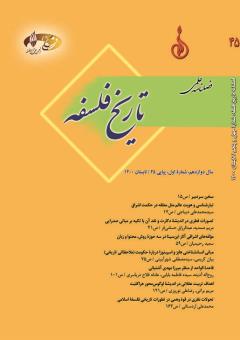اهداف تربیت عقلانی در اندیشه لوگوس محور هراکلیت
محورهای موضوعی : یافتههای جدید در سیر فلسفه باستان غرب (یونانی و یونانیمآبی)
مریم براتی
1
,
رضاعلی نوروزی
2
*
![]()
1 - دانشجوی دکتری رشته تاریخ و فلسفه تعلیم و تربیت، دانشگاه اصفهان، اصفهان، ایران
2 - دانشیار گروه علوم تربیتی، دانشگاه اصفهان، اصفهان، ایران
کلید واژه: غایت, تربیت عقلانی, لوگوس, هراکلیت, اهداف واسطهيي,
چکیده مقاله :
هدف پژوهش حاضر دستيابي به راهحلهای کاربردی برای حل مسئلة هنجارشکنی جامعه با بهرهگیری از غايتشناسي تربیت عقلانی هراکلیت، فیلسوف پیشاسقراطی یونانی است. این پژوهش از نوع کیفی است که از روش استنتاج عملی فرانکنا بهره برده است. در این راستا، ابتدا آثار بجامانده از هراکلیت بررسی شد و مباحث مرتبط با موضوع استخراج گردید. در مرحلة بعد، بمنظور دستيابي به هدف غایی و اهداف واسطهيي تربیت عقلانی، یک باید آغازین بعنوان مقدمة قیاسی اول در نظر گرفته شد و سپس مبتنی بر یک گزارة واقعنگر فلسفی بعنوان مقدمة دوم قیاس عملی، نتيجة قیاس عملی که همان غایت تربیت عقلانی با اندیشة لوگوسمحور هراکلیت است، استخراج گرديد. در انتها بر اساس این هدف غایی و مبناهای فلسفی دیگر، اهداف واسطهيي تربیت عقلانی هراکلیت استنتاج شد و مبتنی بر این یافتهها، راهکارهایی برای ایجاد فرهنگ هنجارپذیری در جامعة ایران مطرح گردید. نتایج پژوهش نشان میدهد که غایت تربیت عقلانی از دیدگاه هراکلیت، اتصال به لوگوس (عقل کلی) و شناخت آن است تا انسان بتواند قواعد و اصول عقل کلی را کشف كند و مطابق با آن حرکت نمايد و به کمال برسد. بر همین اساس میتوان گفت شناخت قوانین، نخستین هدف در راستاي حل مسئلة هنجارشکنی و سوق دادن بسمت جامعة آرمانی بر مبنای قوانین است. همچنین بر پاية اهداف واسطهيي تربیت عقلانی هراکلیت این نتیجه بدست میآید که برای ایجاد شناخت و عمل مطابق با هنجار، باید تربیت عقلانی در سه بُعد شناختی ـ شامل خودشناسی و درک و فهم اجتماعی ـ راهبردی ـ شامل مرجع مداری ـ و اخلاقی ـ شامل مبارزه با امیال و تخلق به اخلاق نیکو ـ حاصل شود تا بتوان بر مسئلة هنجارشکنی فائق آمد.
The purpose of the present study is to introduce some practical solutions to the problem of transgression in society through benefitting from the teleology of the rational training of Heraclitus, the Greek pre-Socratic philosopher. This qualitative study was carried out following Frankena’s practical syllogism. In doing so, the researchers firstly investigated Heraclitus’ works and extracted the related discussions. Next, in order to gain access to the ultimate and intermediary goals of rational training, they considered an initial must as the premise of the first deduction and, then, based on a realist philosophical proposition as the second premise of the practical syllogism, its conclusion, which is the same ultimate goal of rational training in Heraclitus’ logos-centered philosophy, was extracted. Finally, based on this ultimate goal and other philosophical principles, they inferred the intermediary goals of Heraclitus’ rational training and, given the findings, presented some strategies for establishing the culture of normativeness. The findings of the study indicate that the end of rational training in Heraclitus’ view is to connect to logos (universal intellect) and to learn about it so that Man can discover the principles and rules of the universal intellect, move ahead accordingly, and attain perfection. Hence, it can be said that attaining the knowledge of laws is the first goal in the process of solving the problem of norm-breaking and moving towards the ideal society based on the laws. Moreover, given the intermediary goals of Heraclitus’ rational training, it can be concluded that, in order to attain knowledge and act according to the norms, rational training must be realized at three levels: cognitive, including self-knowledge and social understanding; strategic, including reference-orientedness, and ethical, including fighting against whims and developing good behavior. In this way, one can overcome the problem of transgression or norm-breaking.
باقری، خسرو (1389) رویکردها و روشهای پژوهش در فلسفه تعلیم و تربیت، تهران: پژوهشکده مطالعات فرهنگی و اجتماعی.
خراسانی، شرفالدین (1395) نخستین فیلسوفان یونان، تهران: علمی و فرهنگی.
درویشی، داریوش (1391) فیلسوف تاریک، آبادان: پرسش.
رضایی، محمد (1384) «میزان، نوع و عوامل مؤثر بر قانونگریزی»، جامعهشناسی ایران، شمارة 3، ص69-47.
سلیمانحشمت، رضا؛ حسینی خامنه، سیدمحمدرضا (1395) «لوگوس و حرکت در فلسفة هراکلیتوس»، تاریخ فلسفه، شمارة1، ص208-189.
صادقی، سهیلا؛ امینیان، احسان (1396) «از هنجارگرایی تا هنجارگریزی: سنخشناسی همنوایی اجتماعی و تحلیل کیفی شرایط علّی مؤثر بر آن»، بررسی مسائل اجتماعی ایران، شمارة2، ص 103-77.
عصمتي، سبحان (1380) «گذري بر آراء فلسفي هراكليتوس»، معرفت، شمارة 42، ص49ـ41.
کاپلستون، فردريك (1380) تاریخ فلسفه، ج1، ترجمة سیدجلالالدین مجتبوي، تهران: سروش.
گاتری، دبلیو. کی. سی. (1376) تاریخ فلسفه یونان (5): هراکلیتوس، ترجمة مهدی قوامصفری، تهران: فکر روز.
Freeman, K. (1948). Ancilla to the Pre-Socratic Philosophers, by Herman Diels, Cambridge, Massachusetts, Harvard University Press.
Halapsis, A. V. (2020). Man, and Logos: Heraclitus’ Secret. Anthropological Measurements of Philosophical Research, No.17, pp. 119-130.
Kahn, Ch., H. (1979). The Art and Thought of Heraclitus: an Edition of the Fragments. CambridgeUniversity Press.
Miller, L. (1981). The Logos of Heraclitus. The Harvard Theologicl Review.
McKirahan, R. D. (2010) Philosophy before Socrates: an introduction with texts and commentary. (2nd. ed.) Indianapolis: Hackett.

